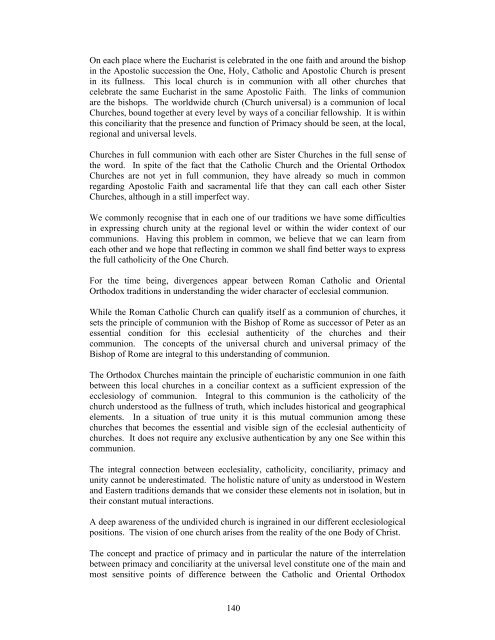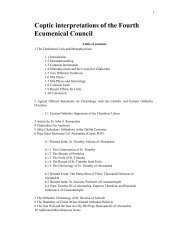Coptic Church & Ecumenical Movement - Saint Mina Coptic ...
Coptic Church & Ecumenical Movement - Saint Mina Coptic ...
Coptic Church & Ecumenical Movement - Saint Mina Coptic ...
Create successful ePaper yourself
Turn your PDF publications into a flip-book with our unique Google optimized e-Paper software.
On each place where the Eucharist is celebrated in the one faith and around the bishop<br />
in the Apostolic succession the One, Holy, Catholic and Apostolic <strong>Church</strong> is present<br />
in its fullness. This local church is in communion with all other churches that<br />
celebrate the same Eucharist in the same Apostolic Faith. The links of communion<br />
are the bishops. The worldwide church (<strong>Church</strong> universal) is a communion of local<br />
<strong>Church</strong>es, bound together at every level by ways of a conciliar fellowship. It is within<br />
this conciliarity that the presence and function of Primacy should be seen, at the local,<br />
regional and universal levels.<br />
<strong>Church</strong>es in full communion with each other are Sister <strong>Church</strong>es in the full sense of<br />
the word. In spite of the fact that the Catholic <strong>Church</strong> and the Oriental Orthodox<br />
<strong>Church</strong>es are not yet in full communion, they have already so much in common<br />
regarding Apostolic Faith and sacramental life that they can call each other Sister<br />
<strong>Church</strong>es, although in a still imperfect way.<br />
We commonly recognise that in each one of our traditions we have some difficulties<br />
in expressing church unity at the regional level or within the wider context of our<br />
communions. Having this problem in common, we believe that we can learn from<br />
each other and we hope that reflecting in common we shall find better ways to express<br />
the full catholicity of the One <strong>Church</strong>.<br />
For the time being, divergences appear between Roman Catholic and Oriental<br />
Orthodox traditions in understanding the wider character of ecclesial communion.<br />
While the Roman Catholic <strong>Church</strong> can qualify itself as a communion of churches, it<br />
sets the principle of communion with the Bishop of Rome as successor of Peter as an<br />
essential condition for this ecclesial authenticity of the churches and their<br />
communion. The concepts of the universal church and universal primacy of the<br />
Bishop of Rome are integral to this understanding of communion.<br />
The Orthodox <strong>Church</strong>es maintain the principle of eucharistic communion in one faith<br />
between this local churches in a conciliar context as a sufficient expression of the<br />
ecclesiology of communion. Integral to this communion is the catholicity of the<br />
church understood as the fullness of truth, which includes historical and geographical<br />
elements. In a situation of true unity it is this mutual communion among these<br />
churches that becomes the essential and visible sign of the ecclesial authenticity of<br />
churches. It does not require any exclusive authentication by any one See within this<br />
communion.<br />
The integral connection between ecclesiality, catholicity, conciliarity, primacy and<br />
unity cannot be underestimated. The holistic nature of unity as understood in Western<br />
and Eastern traditions demands that we consider these elements not in isolation, but in<br />
their constant mutual interactions.<br />
A deep awareness of the undivided church is ingrained in our different ecclesiological<br />
positions. The vision of one church arises from the reality of the one Body of Christ.<br />
The concept and practice of primacy and in particular the nature of the interrelation<br />
between primacy and conciliarity at the universal level constitute one of the main and<br />
most sensitive points of difference between the Catholic and Oriental Orthodox<br />
140








